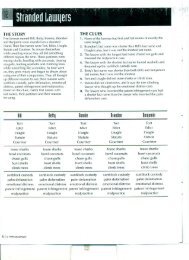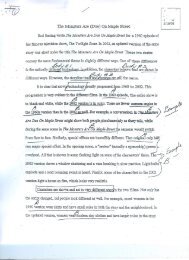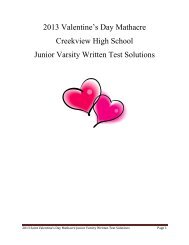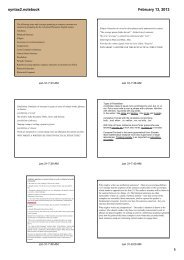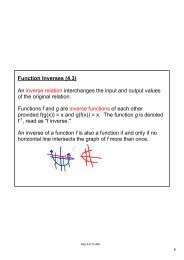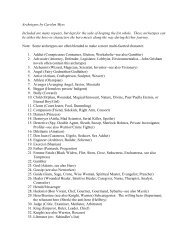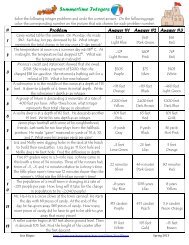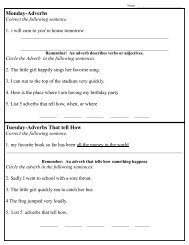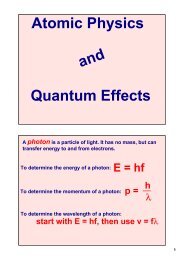Rosencrantz and Guildenstern Are Dead - Cherokee County Schools
Rosencrantz and Guildenstern Are Dead - Cherokee County Schools
Rosencrantz and Guildenstern Are Dead - Cherokee County Schools
You also want an ePaper? Increase the reach of your titles
YUMPU automatically turns print PDFs into web optimized ePapers that Google loves.
Like Beckett's tramps, these two silly, rather likable Elizabethan courtiers are trying to get through life with a<br />
little human dignity <strong>and</strong> perhaps here <strong>and</strong> there a splinter of comprehension. They play games with each other<br />
<strong>and</strong> constantly question not their past (probably only heroes can afford that luxury) but their present <strong>and</strong> their<br />
future. Especially their future.<br />
On the road they meet the strolling players, also, of course, for the plot is a mousetrap seen from the other side<br />
of the cheese, on the road to Elsinore. The leading Player, a charming, honest <strong>and</strong> sinister man, invites the two<br />
to participate in a strolling play. They, with scruples, refuse, but in fact they cannot refuse—because in life this<br />
precisely is what they have done.<br />
Mr. Stoppard seems to see the action of his play unfolding like a juicy onion with strange layers of existence<br />
protectively wrapped around one another. There are plays here within plays—<strong>and</strong> Mr. Stoppard never lets us<br />
forget that his courtiers are not only characters in a life, but also characters in a play. They are modest—they<br />
admit that they are only supporting players. But they do want to see something of the script everyone else is<br />
working from.<br />
It is one, of Mr. Stoppard's cleverest conceits of stage craft that the actors re-enacting the performance of<br />
Hamlet that is, in effect, dovetailed into the main section of the play, use only Shakespeare's words. Thus<br />
while they are waiting in the tattered, drafty ante-chamber of the palace for something to happen, we in the<br />
audience know what is happening on the other side of the stage. As one of them says, "Every exit is an entry<br />
somewhere else."<br />
Finally reduced to the terminal shrifts of unbelief, it seems that <strong>Rosencrantz</strong> <strong>and</strong> Guildenstem realize that the<br />
only way they can find their identity is in their "little deaths." Although on the final, fateful boat they discover<br />
the letter committing them to summary execution in Engl<strong>and</strong>, they go forward to death, glad, even relieved.<br />
It is impossible to re-create the fascinating verbal tension of the play—Mr. Stoppard takes an Elizabethan<br />
pleasure in the sound of his own actors—or the ideas, suggestive, tantalizing that erupt through its texture. Nor,<br />
even most unfortunately, can I suggest the happy, zany humor or even the lovely figures of speech, such as<br />
calling something "like two blind men looting a bazaar for their own portraits." All this is something you must<br />
see <strong>and</strong> hear for yourself.<br />
When the play had its first professional production in London in April of this year it was staged by the British<br />
National Theater, <strong>and</strong> to an extent this version has been reproduced here by its original <strong>and</strong> brilliant director,<br />
Derek Goldby. Helped by the tatterdemalion glories of Desmond Heeley's setting, the richness of his<br />
costumes, <strong>and</strong> Richard Pilbrow's tactfully imaginative lighting, the play looks very similar. But whereas the<br />
supporting players in London—the Hamlet, Claudius <strong>and</strong> the rest—could well have played their roles in<br />
Shakespeare as well as in Stoppard, here there is underst<strong>and</strong>ably less strength.<br />
However, the mime roles or the players (expertly devised by Claude Chagrin) are superbly done, Paul Hecht<br />
is remarkably good as the chief Player (although I would have welcomed a touch more menace) <strong>and</strong> Brian<br />
Murray <strong>and</strong> John Wood provide virtuoso portrayals as <strong>Rosencrantz</strong> <strong>and</strong> <strong>Guildenstern</strong>. Mr. Murray, bl<strong>and</strong>ly<br />
exuding a supreme lack of confidence, <strong>and</strong> Mr. Wood, disturbed, perhaps more intellectually than viscerally,<br />
play against each other like tennis singles champions. And luckily this is a game where neither needs to win<br />
<strong>and</strong> both can share the trophy.<br />
This is a most remarkable <strong>and</strong> thrilling play. In one bound Mr. Stoppard is asking to be considered as among<br />
the finest English-speaking writers of our stage, for this is a work of fascinating distinction. <strong>Rosencrantz</strong> <strong>and</strong><br />
<strong>Guildenstern</strong> LIVE!<br />
Review of <strong>Rosencrantz</strong> <strong>and</strong> <strong>Guildenstern</strong> are <strong>Dead</strong> 18





